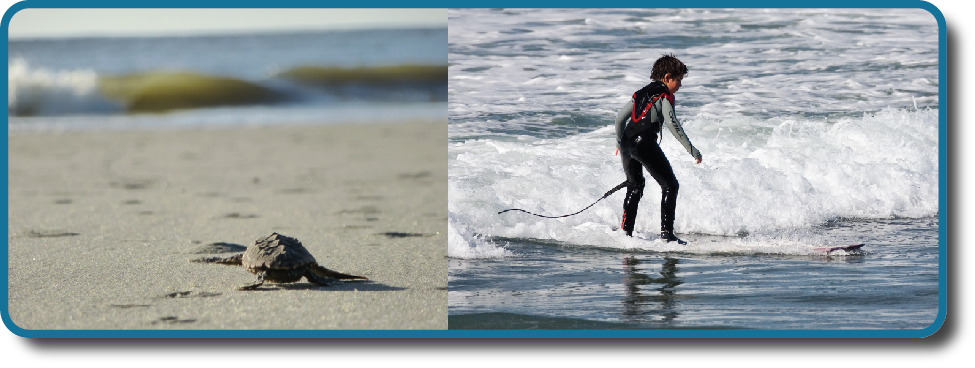| << Chapter < Page | Chapter >> Page > |

The summer sun shines brightly on a deserted stretch of beach. Suddenly, a tiny grey head emerges from the sand, then another and another. Soon the beach is teeming with loggerhead sea turtle hatchlings ( [link] ). Although only minutes old, the hatchlings know exactly what to do. Their flippers are not very efficient for moving across the hot sand, yet they continue onward, instinctively. Some are quickly snapped up by gulls circling overhead and others become lunch for hungry ghost crabs that dart out of their holes. Despite these dangers, the hatchlings are driven to leave the safety of their nest and find the ocean.
Not far down this same beach, Ben and his son, Julian, paddle out into the ocean on surfboards. A wave approaches. Julian crouches on his board, then jumps up and rides the wave for a few seconds before losing his balance. He emerges from the water in time to watch his father ride the face of the wave.
Unlike baby sea turtles, which know how to find the ocean and swim with no help from their parents, we are not born knowing how to swim (or surf). Yet we humans pride ourselves on our ability to learn. In fact, over thousands of years and across cultures, we have created institutions devoted entirely to learning. But have you ever asked yourself how exactly it is that we learn? What processes are at work as we come to know what we know? This chapter focuses on the primary ways in which learning occurs.
Anderson, C. A.,&Gentile, D. A. (2008). Media violence, aggression, and public policy. In E. Borgida&S. Fiske (Eds.), Beyond common sense: Psychological science in the courtroom (p. 322). Malden, MA: Blackwell.
Bandura, A., Ross, D.,&Ross, S. A. (1961). Transmission of aggression through imitation of aggressive models. Journal of Abnormal and Social Psychology, 63 , 575–582.
Cangi, K.,&Daly, M. (2013). The effects of token economies on the occurrence of appropriate and inappropriate behaviors by children with autism in a social skills setting. West Chester University: Journal of Undergraduate Research . Retrieved from http://www.wcupa.edu/UndergraduateResearch/journal/documents/cangi_S2012.pdf
Carlson, L., Holscher, C., Shipley, T.,&Conroy Dalton, R. (2010). Getting lost in buildings. Current Directions in Psychological Science, 19 (5), 284–289.
Cialdini, R. B. (2008). Influence: Science and practice (5th ed.). Boston, MA: Pearson Education.
Chance, P. (2009). Learning and behavior (6th ed.). Belmont, CA: Wadsworth, Cengage Learning.
DeAngelis, T. (2010). ‘Little Albert’ regains his identity. Monitor on Psychology, 41 (1), 10.
Franzen, H. (2001, May 24). Gambling, like food and drugs, produces feelings of reward in the brain. Scientific American [online]. Retrieved from http://www.scientificamerican.com/article.cfm?id=gamblinglike-food-and-dru

Notification Switch
Would you like to follow the 'Psychology' conversation and receive update notifications?